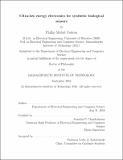Ultra-low energy electronics for synthetic biological sensors
Author(s)
Nadeau, Phillip Michel
DownloadFull printable version (8.681Mb)
Other Contributors
Massachusetts Institute of Technology. Department of Electrical Engineering and Computer Science.
Advisor
Anantha P. Chandrakasan.
Terms of use
Metadata
Show full item recordAbstract
Advances in microelectronics have contributed to the wide availability of wearable sensor nodes for vital signs monitoring. Without additional pieces however, electronics by themselves can perform only basic detection tasks. This work explores the "functionalization" of low-power low-cost microelectronics with equally inexpensive genetically engineered whole-cell microbial sensors to aid in sensing the chemical domain. The driving application is an ingestible sensor for bleeding detection in the gastrointestinal tract. First, we present in vivo measurements of energy-harvesting in the gastrointestinal tract in order to set a power budget for the proposed ingestible sensor. The harvester is based on metal electrodes that react with the stomach contents to generate energy. Here we demonstrate 0.23 [mu]W of average power per mm2 of electrode area delivered to a load for a mean of 6.1 days. Next, we present the design of an ultra-low energy relaxation oscillator. The oscillator can be used as a slow clock source for waking the ingestible sensor from sleep mode and for running slow analog measurements. The core oscillator uses an 18-transistor 3-stage architecture designed to minimize short circuit current and consumes only switching energy across a wide range of Vdd. At 0.6 V, the oscillator system consumes 230 fJ/cycle and can operate across a wide range of low frequencies from 18 Hz to 1000 Hz. Finally, we present the design of an ultra-low energy readout system for genetically engineered whole-cell biosensors. A time-based threshold-crossing scheme is used to quantify the low-intensity bioluminescence incident on the phototransistor detector. The system includes a 900 MHz transmitter, controller, and support electronics on the chip in order to demonstrate molecule-to-wireless-bits sensing on a nanowatt power budget. With the continued expansion of the Internet of Things, the concepts in this thesis can be used to further enhance the capabilities of low-cost microelectronics in the area of vital signs and physiological monitoring. By conferring the ability to sense small molecules using a synthetic biology foundation, new types of low-cost diagnostics can be envisioned for connected health monitoring.
Description
Thesis: Ph. D., Massachusetts Institute of Technology, Department of Electrical Engineering and Computer Science, 2016. This electronic version was submitted by the student author. The certified thesis is available in the Institute Archives and Special Collections. Cataloged from student-submitted PDF version of thesis. Includes bibliographical references (pages 143-151).
Date issued
2016Department
Massachusetts Institute of Technology. Department of Electrical Engineering and Computer SciencePublisher
Massachusetts Institute of Technology
Keywords
Electrical Engineering and Computer Science.